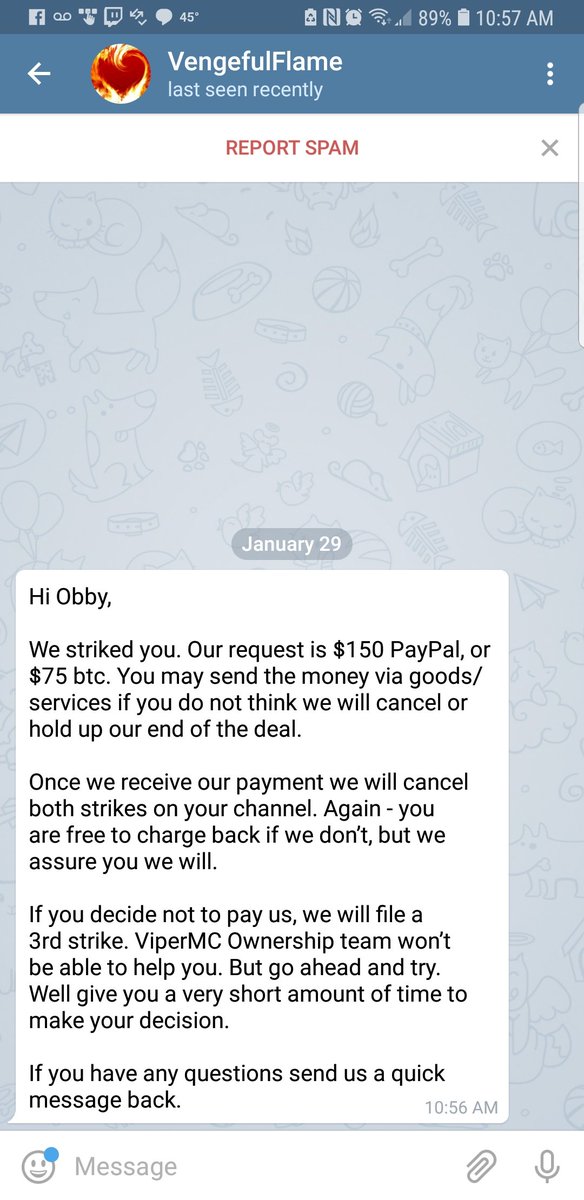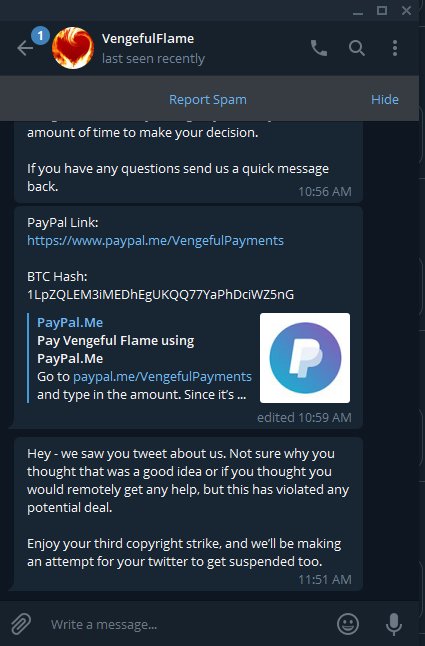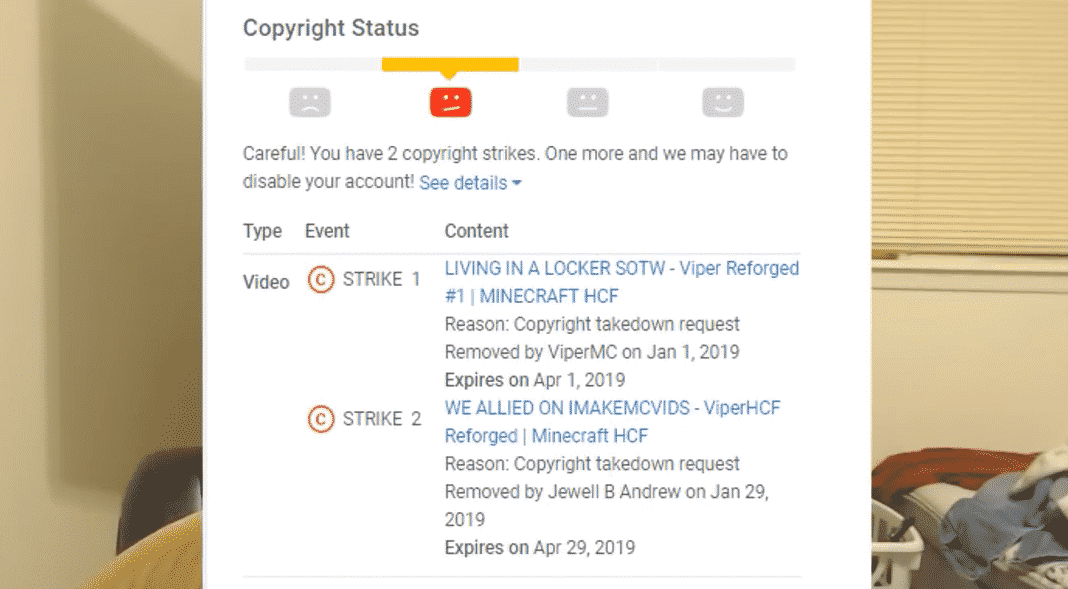A Case of Actual Copyright Extortion
Making copyright extortion literal...

When it comes to copyright, the word “extortion” gets thrown around a lot.
As rightsholders pursue infringement, they are often accused of extorting others. However, it rarely is actual extortion, especially in the legal sense of the word.
Legitimate disputes over copyright are common and, though some rightsholders can be so heavy handed as to feel extortive, their concerns are, at the very least, legitimate.
However, YouTuber ObbyRaidz recently encountered a case of actual copyright extortion that faced him with the choice of either paying up or possibly having his account terminated.
While the effort didn’t succeed (and, in fact, seems to have backfired spectacularly), many are worried that it could just be the first of a new wave of such attacks and that YouTube, as well as other hosts, may not be prepared for it.
The Story So Far

On January 29, YouTuber ObbyRaidz posted on his Twitter that a screenshot of a message from Twitter user VengefulFlame. The message simply began as follows:
Hi Obby, We striked you. Our request is $150 PayPal or $75 btc (Bitcoin). You may send the money via goods/services if you do not think we will cancel or hold up our end of the deal….
The note then went on to threaten a third strike, which would lead to his account being disabled, if he did not pay up. The scammer then said they would give him a “short amount of time” to make his decision.
ObbyRaidz did not pay and VengefulFlame took umbrage to ObbyRaidz’s decision to tweet about it saying that it “has violated any potential deal.” and then threatened to send the third strike. ObbyRaidz also took to YouTube to tell his side of the story and ask for help from the community.
However, the story quickly took flight. A Reddit post about the issue began to rise to the top of r/YouTube pretty soon thereafter, another YouTuber, named Kenzo, posted a video reporting a very similar extortion scheme involving the same person.
Despite the attention, ObbyRaidz reported that he was struggling to get help from YouTube admins. It ended up being on the r/YouTube thread where he got assistance, with a YouTube community manager reporting that they removed the strikes and reinstated the videos involved. Kenzo’s situation was similarly addressed.
However, as of this writing, PayPal has not removed VengelfulFlame’s payment page, though YouTube has said it’s disabled his accounts on the site.
Though it seems to be a story with a happy ending, or at least one on the way to a happy ending, many are worried that this could be just the tip of a tidal wave of false notices, all with the intent of extorting money from unsuspecting YouTubers.
But, while the fear is understandable, this is a type of scam that can be, on the whole, easily thwarted. In short, the scammers are preying on the fear of copyright as much as actual copyright law.
How the Scam Works

The idea behind the scam is remarkably simple. Under the Digital Millennium Copyright Act (DMCA), hosts are obliged to remove or disable access to allegedly infringing works after receiving a proper notice of copyright infringement.
The law sets standards for what has to be in a notice of copyright infringement. Among those requirements, filers have to swear under penalty of perjury that they have a good faith belief the notice is accurate and that they are either the rightsholder or an authorized agent.
However, the law does not require hosts, such as YouTube, to verify that information. In fact, if hosts ignore a valid notice because they believe it to be false, they open themselves up to liability. As such, most hosts make little attempt to verify the claims in the notice itself.
This opens the door for scammers, such as VengefulFlame, to file takedown notices and reasonably expect that content will be removed. Furthermore, since the law also requires hosts to terminate the accounts of repeat infringers, repeated notices can result in termination, such as through YouTube’s copyright strike system.
The DMCA did consider this and provides for damages for those who knowingly file false DMCA notices, such as these scammers. However, such damages are largely academic as many of the scammers are, most likely, out of the country or otherwise nearly impossible to sue.
The result of this is that anyone, at any time, can file a copyright notice and be reasonably assured that their notice will both be effective and that they, as the filer, will not see any repercussions for filing the false notice.
But, while this seems like a hopeless situation, it’s far from it. The law does empower those who are the subject of DMCA notices with a powerful weapon, if they know to use it.
Fighting Back
A DMCA takedown notice is, technically, just the first part of the DMCA process. Once hit by a notice, a user has two options. They can either accept the takedown and move on, or file a counter-notice and ask the host to put it back.
Though a counter-notice doesn’t obligate the host to restore the content, it frees them from liability if they do so. All a host has to do is wait a mandatory amount of time, usually two weeks, and the content can be restored with no legal risk to them.
During that time, the original filer can either accept the counter-notice or file a lawsuit to seek an injunction. However, given the time and expense required to file such a lawsuit, most simply accept that the content is being restored.
With YouTube, a counter-notice is particularly important as it removes copyright strikes. Quickly filing counter-notices for false copyright strikes is one of the most important things you can do if you are the victim of such an attack.
That being said, counter-notices are limited for two key reasons:
- The content remains down for two weeks, unless YouTube (or the host) decides to restore it earlier.
- Many users are intimidated by the counter-notice process, especially as it will provide personal information to the scammer.
The second issue is a particularly thorny one. By filing a counter-notice, you’re basically telling a DMCA filer that they will have to sue you to keep the content offline. That is, in a word, intimidating. Even if you know you’re not infringing, it can be scary.
However, because of that, it also requires that you provide information that would enable the filer to file a lawsuit if they chose to. This includes your name, address and other contact information. Giving this information to a scammer is less than ideal, but a prompt counter-notice is one of the most important things you can do if you are the subject of a clearly false notice.
That said it’s not advised in cases where the notice has any legitimacy. Simply put, you don’t want to escalate a copyright strike to a copyright lawsuit. Because of that, you want to be careful when filing a counter-notice but you should not be intimidated to do it when the notice is clearly false.
Once the counter-notice is filed, then you can provide the information to YouTube (or any other host) to prove that the notice was abusive. They may restore the content more quickly after they see that. However, even if they don’t, the counter-notice will get content restored and the strikes resolved in due time.
Though it’s far from a perfect solution, it’s at least a solution that users can take advantage of today. Longer term solutions are going to have to come from hosts, or possibly the law.
Fixing the Larger Problem
The good news is that there isn’t a common problem right now. Mathematically, such clearly and knowingly false DMCA notices are still extremely rare. Even on YouTube, with its much-maligned copyright systems, most issues are related to poor matching by their automated system (which is outside of the DMCA process) and mistakes by rightsholders.
It’s also unlikely that this will become a major trend. The DMCA has been in effect for over 20 years and, while there have definitely been false notices and even similar cases of extortion, they’ve remained rare.
Simply put, there are better and easier ways to extort people than using false copyright notices or the threat of them.
Still, even a small number of such false notices are too much and, to battle this problem, hosts are going to have to get more savvy. Learning to spot warning signs that a notice might be false, investigating suspicious notices and rejecting them, even if it means taking a legal risk.
In the case of VengefulFlame, he filed his notices from a free gmail account rather than an account tied to a rightsholder or a known copyright-protection organization. While it’s not a reason to dismiss the notice outright, it’s a reason to follow up on it, at least until account is verified.
However, taking such extra steps is going to be challenging. Not only does the law require that hosts “expeditiously” remove allegedly infringing material, but hosts view this process as a burden that they seek to minimize. Adding extra steps not only raises legal risks, but costs.
To that end, the law may have to be changed to give hosts extra flexibility in this area or to simply require that filers provide some form of verification.
Though such a change is likely, as is almost any major change to copyright law, it is something that’s well worth considering.
In the meantime, hosts can invest more in addressing these issues, but only if they have both the will and resources to do so.
Bottom Line
In the end, the issue is still a very rare one right now and it’s unlikely to be come a major trend.
However, the best way to combat it is, if you publish online, is to be aware of both your rights and responsibilities when you do so. As someone who has been threatened with dozens of lawsuits, being aware of the law is what gives you the power when others try to threaten you with it.
So, if this is something that you are worried about or are confronting, the best thing you can do is research. Study the law, understand your rights and respond quickly and decisively to any such threats you see.
In my experience, bullies tend to shy away when they meet someone who doesn’t back down. That goes for bullies of all types, including these scammers.
In the end, the best defense against a copyright bully is knowing for certain you are on the right side of the law.
Want to Reuse or Republish this Content?
If you want to feature this article in your site, classroom or elsewhere, just let us know! We usually grant permission within 24 hours.
